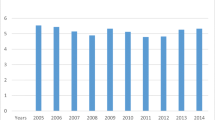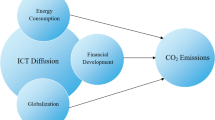Abstract
The increasing use of information and communication technology (ICT) in this digital era and its interlinkage with other economic and environmental factors have gotten considerable attention from researchers. ICT tools are considered very important in economic activities such as international trade, the financial sector, and foreign direct investment. ICT is also interlinked with innovation and energy consumption. However, ICT with these activities influences ecological footprint, especially in emerging economies such as BRICS (Brazil, Russia, India, China, and South Africa) countries. Therefore, this topic has got considerable attention from researchers and policy makers on the impact of ICT and economic growth activities on environmental quality. Consequently, this study investigates the impact of information and communication technology, renewable energy consumption and innovation on carbon dioxide emission in BRICS countries from 1990 to 2019 using cointegration, generalized least square, and panel corrected standard errors models. The findings show that two ICT indicators, mobile cellular subscription and fixed broadband subscription, negatively affect carbon emission along with economic growth and financial development. Innovation and renewable energy consumption also significantly reduce emission in presence of ICT indicators, while trade openness and fixed telephone subscriptions increase it. In the case of the ICT index model, all variables are positively associated with carbon emission except renewable energy consumption, however, the square and interaction term of all indicators significantly reduce carbon emission and evidence the environmental Kuznets curve hypothesis except trade openness. ICT growth should be considered in the energy sector, innovation, and financial development to enhance environmental quality. The findings of the study have considerable policy implications for the sample countries.
Similar content being viewed by others
References
Adedoyin FF, Bekun FV, Driha OM, Balsalobre-Lorente D (2020) The effects of air transportation, energy, ICT and FDI on economic growth in the industry 4.0 era: evidence from the United States. Technological Forecasting and Social Change 160:120297
Ahmed Z, Nathaniel SP, Shahbaz M (2021) The criticality of information and communication technology and human capital in environmental sustainability: evidence from Latin American and Caribbean countries. Journal of Cleaner Production 286:125529
Al-Mulali U, Ozturk I, Lean HH (2015) The influence of economic growth, urbanization, trade openness, financial development, and renewable energy on pollution in Europe. Natural Hazards 79(1):621–644
Álvarez-Herránz A, Balsalobre D, Cantos JM, Shahbaz M (2017) Energy innovations-GHG emissions nexus: fresh empirical evidence from OECD countries. Energy Policy 101:90–100
Atsu, F., Adams, S., & Adjei, J. (2021). ICT, energy consumption, financial development, and environmental degradation in South Africa. Heliyon, e07328.
Bhattacharya M, Churchill SA, Paramati SR (2017) The dynamic impact of renewable energy and institutions on economic output and CO2 emissions across regions. Renewable Energy 111:157–167
Çakar, N. D., Gedikli, A., Erdoğan, S., & Yıldırım, D. Ç. (2021). A comparative analysis of the relationship between innovation and transport sector carbon emissions in developed and developing Mediterranean countries. Environmental Science and Pollution Research, 1-21.
Chen Y, Zhu J (2004) Measuring information technology's indirect impact on firm performance. Information Technology and Management 5(1):9–22
Chien F, Anwar A, Hsu C-C, Sharif A, Razzaq A, Sinha A (2021) The role of information and communication technology in encountering environmental degradation: proposing an SDG framework for the BRICS countries. Technology in Society 65:101587
Danish. (2019). Effects of information and communication technology and real income on CO2 emissions: the experience of countries along belt and road. Telematics and Informatics, 45.
Díaz-Roldán C, Ramos-Herrera MDC (2021) Innovations and ICT: do they favour economic growth and environmental quality? Energies 14(5):1431
Faisal, F., Tursoy, T., & Pervaiz, R. (2020). Does ICT lessen CO 2 emissions for fast-emerging economies? An application of the heterogeneous panel estimations. Environmental Science and Pollution Research, 1-12.
Hanif I, Raza SMF, Gago-de-Santos P, Abbas Q (2019) Fossil fuels, foreign direct investment, and economic growth have triggered CO2 emissions in emerging Asian economies: some empirical evidence. Energy 171:493–501
Jebli MB, Youssef SB, Apergis N (2019) The dynamic linkage between renewable energy, tourism, CO 2 emissions, economic growth, foreign direct investment, and trade. Latin American Economic Review 28(1):1–19
Khan H, Khan I, Binh TT (2020a) The heterogeneity of renewable energy consumption, carbon emission and financial development in the globe: a panel quantile regression approach. Energy Reports 6:859–867
Khan, H., Khan, I., Kim Oanh, L. T., & Lin, Z. (2020b). The dynamic interrelationship of environmental factors and foreign direct investment: dynamic panel data analysis and new evidence from the globe. Mathematical Problems in Engineering, 2020.
Khan, H., Khan, S., & Zuojun, F. (2020c). Institutional quality and financial development: evidence from developing and emerging economies. Global Business Review, 0972150919892366.
Khan, H., Weili, L., & Khan, I. (2021e). Environmental innovation, trade openness and quality institutions: an integrated investigation about environmental sustainability. Environment, Development and Sustainability, 1-31.
Khan, H., Weili, L., & Khan, I. (2021f). Institutional quality, financial development and the influence of environmental factors on carbon emissions: evidence from a global perspective. Environmental Science and Pollution Research, 1-13.
Khan H, Weili L, Khan I (2021g) Recent advances in energy usage and environmental degradation: does quality institutions matter? A worldwide evidence. Energy Reports 7:1091–1103
Khan, H., Weili, L., Khan, I., & Han, L. (2021c). The effect of income inequality and energy consumption on environmental degradation: the role of institutions and financial development in 180 countries of the world. Environmental Science and Pollution Research, 1-18.
Khan, H., Weili, L., Khan, I., & Khamphengxay, S. (2021d). Renewable energy consumption, trade openness, and environmental degradation: a panel data analysis of developing and developed countries. Mathematical Problems in Engineering, 2021.
Khan, I., Han, L., & Khan, H. (2021a). Renewable energy consumption and local environmental effects for economic growth and carbon emission: evidence from global income countries. Environmental Science and Pollution Research, 1-18.
Khan, I., Han, L., Khan, H., & Kim Oanh, L. T. (2021b). Analyzing renewable and nonrenewable energy sources for environmental quality: dynamic investigation in developing countries. Mathematical Problems in Engineering, 2021.
Khan N, Baloch MA, Saud S, Fatima T (2018) The effect of ICT on CO 2 emissions in emerging economies: does the level of income matters? Environmental Science and Pollution Research 25(23):22850–22860
Latif Z, Latif S, Ximei L, Pathan ZH, Salam S, Jianqiu Z (2018) The dynamics of ICT, foreign direct investment, globalization and economic growth: panel estimation robust to heterogeneity and cross-sectional dependence. Telematics and Informatics 35(2):318–328
Latif Z, Xin W, Khan D, Iqbal K, Pathan ZH, Salam S, Jan N (2017) ICT and sustainable development in South Asian countries. Human Systems Management 36(4):353–362
Liu X, Latif K, Latif Z, Li N (2020) Relationship between economic growth and CO 2 emissions: does governance matter? Environmental Science and Pollution Research 27(14):17221–17228
Liu X, Latif Z, Latif S, Mahmood N (2021) The corruption-emissions nexus: do information and communication technologies make a difference? Utilities Policy 72:101244
Mensah IA, Sun M, Gao C, Omari-Sasu AY, Zhu D, Ampimah BC, Quarcoo A (2019) Analysis on the nexus of economic growth, fossil fuel energy consumption, CO2 emissions and oil price in Africa based on a PMG panel ARDL approach. Journal of Cleaner Production 228:161–174
Nasreen S, Anwar S, Ozturk I (2017) Financial stability, energy consumption and environmental quality: evidence from South Asian economies. Renewable and Sustainable Energy Reviews 67:1105–1122
Ozcan B, Apergis N (2018) The impact of internet use on air pollution: evidence from emerging countries. Environmental Science and Pollution Research 25(5):4174–4189
Ozturk I, Acaravci A (2013) The long-run and causal analysis of energy, growth, openness and financial development on carbon emissions in Turkey. Energy Economics 36:262–267
Paramati SR, Sinha A, Dogan E (2017) The significance of renewable energy use for economic output and environmental protection: evidence from the Next 11 developing economies. Environmental Science and Pollution Research 24(15):13546–13560
Park Y, Meng F, Baloch MA (2018) The effect of ICT, financial development, growth, and trade openness on CO 2 emissions: an empirical analysis. Environmental Science and Pollution Research 25(30):30708–30719
Pesaran MH (2007) A simple panel unit root test in the presence of cross-section dependence. Journal of applied econometrics 22(2):265–312
Raheem ID, Tiwari AK, Balsalobre-Lorente D (2020) The role of ICT and financial development in CO 2 emissions and economic growth. Environmental Science and Pollution Research 27(2):1912–1922
Shahzad K, Jianqiu Z, Hashim M, Nazam M, Wang L (2020) Impact of using information and communication technology and renewable energy on health expenditure: a case study from Pakistan. Energy 204:117956
Sinha A, Shah MI, Sengupta T, Jiao Z (2020) Analyzing technology-emissions association in top-10 polluted MENA countries: how to ascertain sustainable development by quantile modeling approach. Journal of Environmental Management 267:110602
Su C-W, Xie Y, Shahab S, Faisal C, Nadeem M, Hafeez M, Qamri GM (2021) Towards achieving sustainable development: role of technology innovation, technology adoption and CO2 emission for BRICS. International Journal of Environmental Research and Public Health 18(1):277
Su Q, Feng W, Yang D, Li F (2017) Resonance energy transfer in upconversion nanoplatforms for selective biodetection. Accounts of chemical research 50(1):32–40
Tsaurai, K., & Chimbo, B. (2019). Information and communication technology (ICT) led tourism growth nexus in transitional markets. Acta Universitatis Danubius. Œconomica, 15(5).
Ulucak R, Khan SU-D (2020) Determinants of the ecological footprint: role of renewable energy, natural resources, and urbanization. Sustainable Cities and Society 54:101996
Westerlund J (2007) Testing for error correction in panel data. Oxford Bulletin of Economics and statistics 69(6):709–748
Zhang J, Wang B, Latif Z (2019) Towards cross-regional sustainable development: the nexus between information and communication technology, energy consumption, and CO 2 emissions. Sustainable Development 27(5):990–1000
Data availability
Data are available upon reasonable request from the corresponding author.
Funding
This research is supported by the major project funded by the Research Base of Humanities and Social Sciences of the Ministry of Education of China “Comparative Study of Chinese and Foreign Special Economic Zones” (project no. 16JJD790042).
Author information
Authors and Affiliations
Contributions
A formal analysis was performed by Hayat Khan. Direction and supervision were given by Liu Weili. Interpretation of results and writing were done by Itbar Khan.
Corresponding author
Ethics declarations
Ethical approval
Not applicable
Consent to participate
Not applicable
Consent to publish
Not applicable
Competing interests
The authors declare no competing interests.
Additional information
Responsible Editor: Roula Inglesi-Lotz
Publisher’s note
Springer Nature remains neutral with regard to jurisdictional claims in published maps and institutional affiliations.
Rights and permissions
About this article
Cite this article
Khan, H., Weili, L. & Khan, I. Examining the effect of information and communication technology, innovations, and renewable energy consumption on CO2 emission: evidence from BRICS countries. Environ Sci Pollut Res 29, 47696–47712 (2022). https://doi.org/10.1007/s11356-022-19283-y
Received:
Accepted:
Published:
Issue Date:
DOI: https://doi.org/10.1007/s11356-022-19283-y




